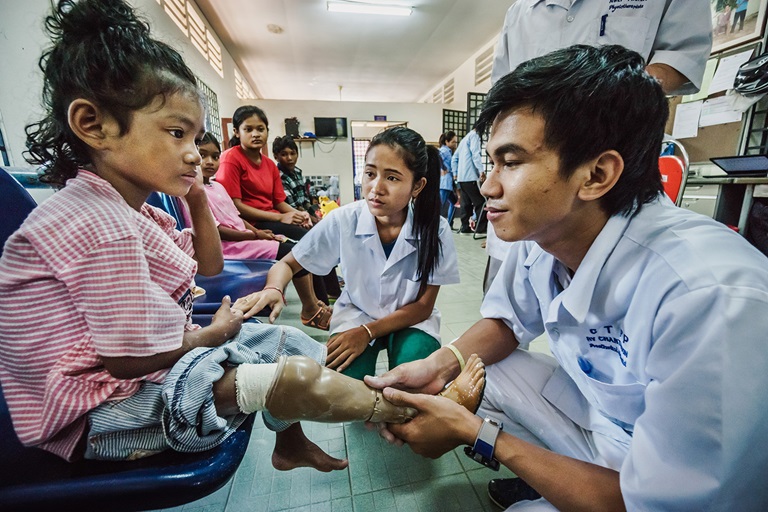MANILA, 12 October 2018 – On the final day of the sixty-ninth session of the World Health Organization (WHO) Regional Committee for the Western Pacific, governments today committed to provide adequate rehabilitation services. They also discussed the Region’s progress in health security, control of infectious diseases, noncommunicable disease and environmental health.
Responding to demand for rehabilitation services
Recognizing that rehabilitation services are important for individuals recovering from illness or injury to restore health and well-being and to manage long-term health, delegates endorsed the Western Pacific Regional Framework on Rehabilitation.
Ageing populations and rising rates of noncommunicable diseases such as diabetes have increased the demand for rehabilitation services in the Western Pacific Region. More than one in four people in the Region will be aged 60 years or older by 2050, and the prevalence of noncommunicable diseases has increased drastically. Despite growing demand, access to rehabilitation services is sporadic, and quality is inconsistent. The new Framework will directly address these challenges. This week, health ministers also reviewed the Region’s progress in several other areas.
Health security
The Region continues to face health security and emergency threats, such as Typhoon Ompong in the Philippines, Tropical Cyclone Gita in the Pacific and polio in Papua New Guinea. Member States, WHO and other partners have worked together to strengthen country capacities to address these threats through implementation of the Asia Pacific Strategy for Emerging Diseases and Public Health Emergencies (APSED III) and the Western Pacific Regional Framework for Action for Disaster Risk Management for Health. The power of preparedness has been demonstrated in the successful response to several recent events, including an imported case of Middle East Respiratory Syndrome in the Republic of Korea. However, it was noted that all countries must continue to invest in preparedness for outbreaks and emergencies, particularly ahead of the next pandemic.
Delegates also noted that governments in the Region have developed policies, implemented actions and strengthened systems to combat antimicrobial resistance. To date, 15 of the Region’s 37 countries and areas have national action plans, and four more are in the process of developing plans. Challenges remain, but the directions for country action are clear: the human health, animal and agriculture sectors must work together; stronger institutions are needed as well as increased accountability and better evidence and information for decision-making.
Noncommunicable diseases
Efforts are ongoing to reduce tobacco and harmful alcohol use, to tackle obesity in children and adults, and to make cities and islands healthier. Delegates noted the variable progress in reducing noncommunicable diseases (NCDs). In the Region as a whole, the probability of dying prematurely from NCDs has decreased slightly—from 17.1% in 2010 to 16.2% in 2016—but bolder action is required to achieve the Sustainable Development Goal (SDG) target: to cut premature deaths from NCDs by one third by 2030 through prevention, treatment, and promotion of mental health and well-being.
Environmental health
Delegates noted the Region’s progress in addressing the health impacts of environmental and climate change, but action must be accelerated to achieve the SDGs. Environmental health issues include: the impact of air pollution, which contributes to 2.7 million deaths a year in the Region; safe water and sanitation, including in health facilities, which remains a challenge in some countries; and addressing the health effects of climate change, which is a particularly critical issue for small island developing states in the Pacific. They also discussed WHO support to Member States in strengthening health systems to address occupational and environmental hazards, such as asbestos and mercury.
Infectious diseases
In discussions on infectious diseases, delegates noted the Region’s progress in malaria control and elimination, and towards achievement of immunization goals.
In 2016, the Region achieved 97.5% coverage of three doses of diphtheria–tetanus–pertussis vaccine. Countries are working with WHO and other partners to maintain their polio-free status, eliminate measles, rubella, and maternal and neonatal tetanus, to control hepatitis B and Japanese encephalitis, and to introduce new vaccines.
Countries are also working towards the goal of an Asia Pacific free of malaria by 2030 through universal access to prevention, diagnosis and treatment, strengthened surveillance and monitoring of antimalarial drug and insecticide resistance.
The sixty-ninth session of the Regional Committee concluded after discussions on WHO reform and the agenda for the seventieth session, which will take place on 7–11 October 2019 in Manila, Philippines.
Related links:
More on the sixty-ninth session of the WHO Regional Committee for the Western Pacific
Rehabilitation
Keeping the Region safe
Notes to editors
The Regional Committee is streamed live on the WHO website www.who.int/westernpacific and updates are being posted on the @WHOWPRO Facebook and Twitter accounts with the hashtag #RCM69.
Working with 194 Member States across six regions, WHO is the United Nations agency responsible for public health. Each WHO region has its own regional committee, composed of ministers of health and senior officials from Member States, who meet annually. The Regional Committee sets policies and reviews WHO’s work over the previous year.
The 37 countries and areas of the WHO Western Pacific Region are: American Samoa (USA), Australia, Brunei Darussalam, Cambodia, China, Cook Islands, Fiji, French Polynesia (France), Guam (USA), Hong Kong SAR (China), Japan, Kiribati, Lao People’s Democratic Republic, Macao SAR (China), Malaysia, Marshall Islands, Micronesia (Federated States of), Mongolia, Nauru, New Caledonia (France), New Zealand, Niue, Commonwealth of the Northern Mariana Islands (USA), Palau, Papua New Guinea, Philippines, Pitcairn Islands (UK), Republic of Korea, Samoa, Singapore, Solomon Islands, Tokelau, Tonga, Tuvalu, Vanuatu, Viet Nam, and Wallis and Futuna (France).

